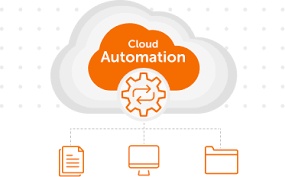Cloud automation is a technology that has revolutionized the way businesses operate. It refers to automating various tasks and processes in managing cloud infrastructure and services. Cloud orchestration allows organizations to automate their cloud resources' deployment, scaling, and management, optimizing their operations and reducing costs.
The basic premise of cloud orchestration is to use software tools to manage and orchestrate complex cloud environments. Automating routine tasks, such as provisioning and configuring virtual machines, managing storage, and monitoring applications. Cloud orchestration enables IT teams to focus on higher-value activities that drive business outcomes.
In cloud orchestration, software tools are used to simplify the management of cloud resources and provide an efficient, reliable, and scalable infrastructure. These tools leverage APIs and other interfaces to automate resource allocation, monitoring, and security tasks. In addition, cloud orchestration provides a high degree of flexibility, enabling organizations to rapidly scale resources up or down based on their business needs.
Types Of Cloud Orchestration
There are several kinds of cloud orchestration, each intended to automate a distinct component of cloud infrastructure and services. Here are a few of the most typical types:
Infrastructure As Code (IaC)
Infrastructure as Code (IaC) is a type of cloud automation that uses scripts to automate the provisioning, configuration, and deployment of cloud infrastructure resources. Tools such as Terraform, CloudFormation, and Ansible make it easy to create, manage, and scale cloud infrastructure quickly.
Continuous Integration And Continuous Deployment (CI/CD)
Continuous Integration and Continuous Deployment (CI/CD) automate the build, testing, and deployment of software applications in cloud environments. Tools like Jenkins and GitLab help organizations quickly and reliably release new features and updates.
Autoscaling
Autoscaling is a form of cloud orchestration that adjusts the number of cloud resources allocated to an application based on its usage patterns. This helps ensure that applications have the resources to meet demand while optimizing costs and performance levels. It is supported by tools such as AWS Auto Scaling and Google Cloud Autoscaling.
Benefits Of Cloud Orchestration
Organizations looking to improve their cloud architecture and operations may benefit from cloud orchestration. Here are a few of the main advantages:
1. Enhanced Productivity
Organizations that use cloud orchestration may simplify their cloud operations, eliminate manual chores, and free up IT employees to concentrate on higher-value work.
2. Cost Savings
Cloud orchestration may assist businesses in lowering the cost of their cloud infrastructure by automating repetitive operations and maximizing resource consumption.
3. Improved Scalability
Organizations may use cloud orchestration solutions to swiftly scale their cloud resources up or down in accordance with their business demands, allowing them to react quickly to changing needs.
4. Enhanced Dependability
Automation in the cloud can lower the possibility of human mistakes, making cloud infrastructure and services more dependable.
5. Faster Time-To-Market
Businesses may reliably and rapidly roll out new features and upgrades by automating the deployment and testing of software applications in cloud settings.
6. Enhanced Security
To maintain a safe and compliant cloud environment, enterprises may use cloud orchestration solutions to enforce security rules and automate security processes like vulnerability scanning.


No comments yet